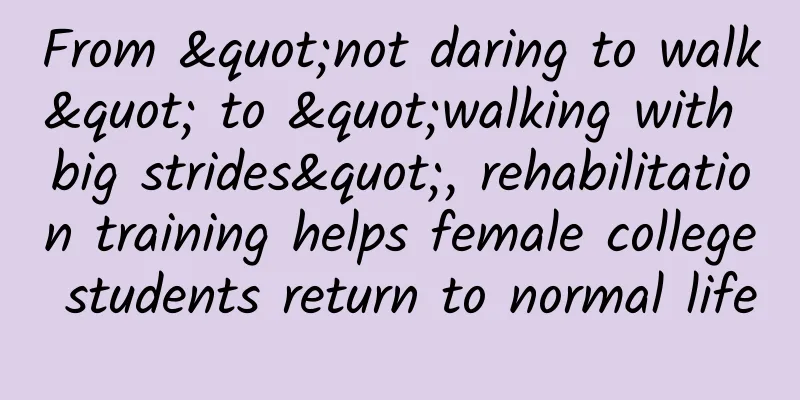From "not daring to walk" to "walking with big strides", rehabilitation training helps female college students return to normal life

|
A young female patient came to the rehabilitation center on the first floor of Hunan Want Want Hospital wearing a brace and using crutches. After questioning, we learned that the 20-year-old female college student had a ruptured anterior cruciate ligament of her left knee due to a fall during an outdoor team-building activity. After undergoing anterior cruciate ligament reconstruction at Hunan Want Want Hospital, her training at home was not effective, and her knee flexion range of motion did not reach 90°. She came here this time hoping to get back on track in life as soon as possible with the help of rehabilitation training. Through communication with orthopedic physicians, the rehabilitation physician learned about the patient's surgical procedure and related imaging examinations, and then provided a professional rehabilitation assessment and developed a detailed rehabilitation training plan. According to clinical rehabilitation guidelines, knee flexion should reach 120 degrees six weeks after anterior cruciate ligament reconstruction, but the patient has not yet reached the expected goal. Therefore, the focus of short-term rehabilitation training is on passive knee flexion, which is what we commonly call "downward angle" or "leg bending", while paying attention to controlling the effects of pain and edema. 1. How to perform “leg bending” and a series of rehabilitation training? When it comes to "leg bending", many patients who have undergone fracture surgery or ligament reconstruction are afraid of it because they think that therapists will only emphasize the restoration of the angle and not pay attention to the patient's feelings. However, this student met a therapist who empathized with her in the treatment room. It turned out that her therapist, Dr. Wang, was also a "cross friend" (a patient who had undergone cruciate ligament reconstruction). Seeing Dr. Wang who had already returned to sports, the patient instantly gained great confidence. At the same time, this also gave her greater endurance and confidence in the process of lowering the angle. So how can we avoid joint adhesion after cruciate ligament surgery (and thus avoid leg sprains) or what do we need to do when adhesions form? First of all, after the operation, while controlling pain and swelling, you should strictly follow the instructions of the discharge physician (as shown in the table below), pay attention to the activity of your knee joint, strengthen ankle pump exercises and isometric contractions of the quadriceps. In addition, apply ice in time after early activities to prevent joint edema caused by activities. (Post-operative training and recovery list for cruciate ligament surgery) Secondly, if you find that the joint movement has not reached the expected goal, you need to immediately go to the hospital's rehabilitation medicine department to seek help, and cooperate with the rehabilitation therapist to complete the corresponding "homework", such as self-loosening of the patella, manual loosening of scar tissue around the knee joint, and then to relaxation of the quadriceps and calf triceps, and finally through "wall sliding" and "leg hugging" to complete your own angle maintenance training, laying a good foundation for the next rehabilitation treatment. After ten days of treatment, the student was finally able to walk without crutches from fear at the beginning to confidence, and from passive knee flexion <90° to active knee hugging over 120°, successfully completing the initial rehabilitation goals. After completing the angle restoration and pain control, the rehabilitation therapist formulated mid- and late-stage rehabilitation goals: restore muscle strength to the greatest extent, improve knee proprioception function, basically restore normal walking, and return to normal work and life. Director Xie Ming of the Neurological Medicine Center of Hunan Want Want Hospital suggested : Postoperative rehabilitation training after fracture and ligament reconstruction is currently the most easily overlooked by patients. Many people think they can recover according to the discharge exercise guidance, but the scientificity and accuracy of the training are often unsatisfactory. Therefore, timely visiting the rehabilitation department after orthopedic surgery and seeking help from rehabilitation therapists can help patients improve functional impairments as soon as possible and return to normal life faster! Hunan Medical Chat Special Author: Wang Yuzhe, Rehabilitation and Pain Department, Hunan Want Want Hospital Follow @湖南医聊 to get more health science information! (Edited by Wx) |
<<: How is Mycoplasma pneumoniae spread?
Recommend
What are the symptoms of esophageal cancer? You can do this to prevent esophageal cancer
What are the symptoms of esophageal cancer? Let&#...
How long does it take for menstruation to come back after medical abortion?
Medical abortion means that the pregnancy time mu...
Can I perm my hair while breastfeeding? What are the hazards?
Can I perm my hair while breastfeeding? This is a...
Is ovarian rupture serious?
The female ovary is a very important organ for wo...
Can my aunt eat hot pot?
In Chongqing, spicy food is the main dish. Chongq...
Ovulation bleeding has not healed after a week
A small amount of vaginal bleeding during ovulati...
What should I do if I have breast nodules during lactation?
Once a woman becomes pregnant, the hormones in he...
What to eat to supplement hair loss during breastfeeding
In order for the baby to grow healthily, most mot...
How many men does a woman have in her heart?
Everyone says that men are fickle animals, but in...
How to treat breast nodules?
When female friends have breast nodules, the size...
Is there any way to make my period come faster?
In many cases, the menstrual cycle will have a ce...
Pictures of the earliest stage of vulvar leukoplakia
Vulvar leukoplakia is likely to be caused by prol...
The wolfberry tea we drink regularly can actually cause poisoning... See if you have been poisoned?
In June this year, the "China Cardiovascular...
37 weeks, my stomach is tight and hard
Some pregnant women in their 37th week of pregnan...









